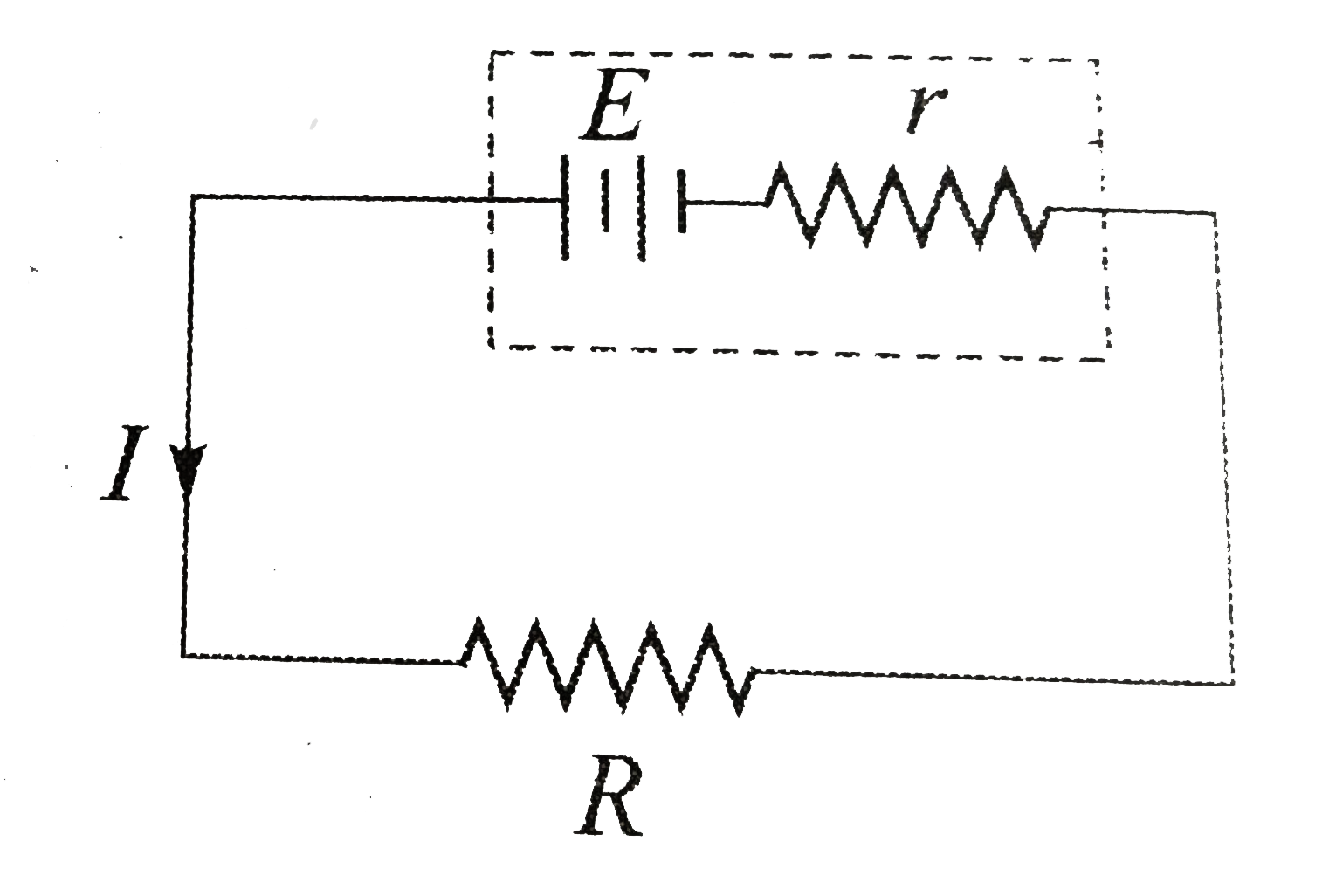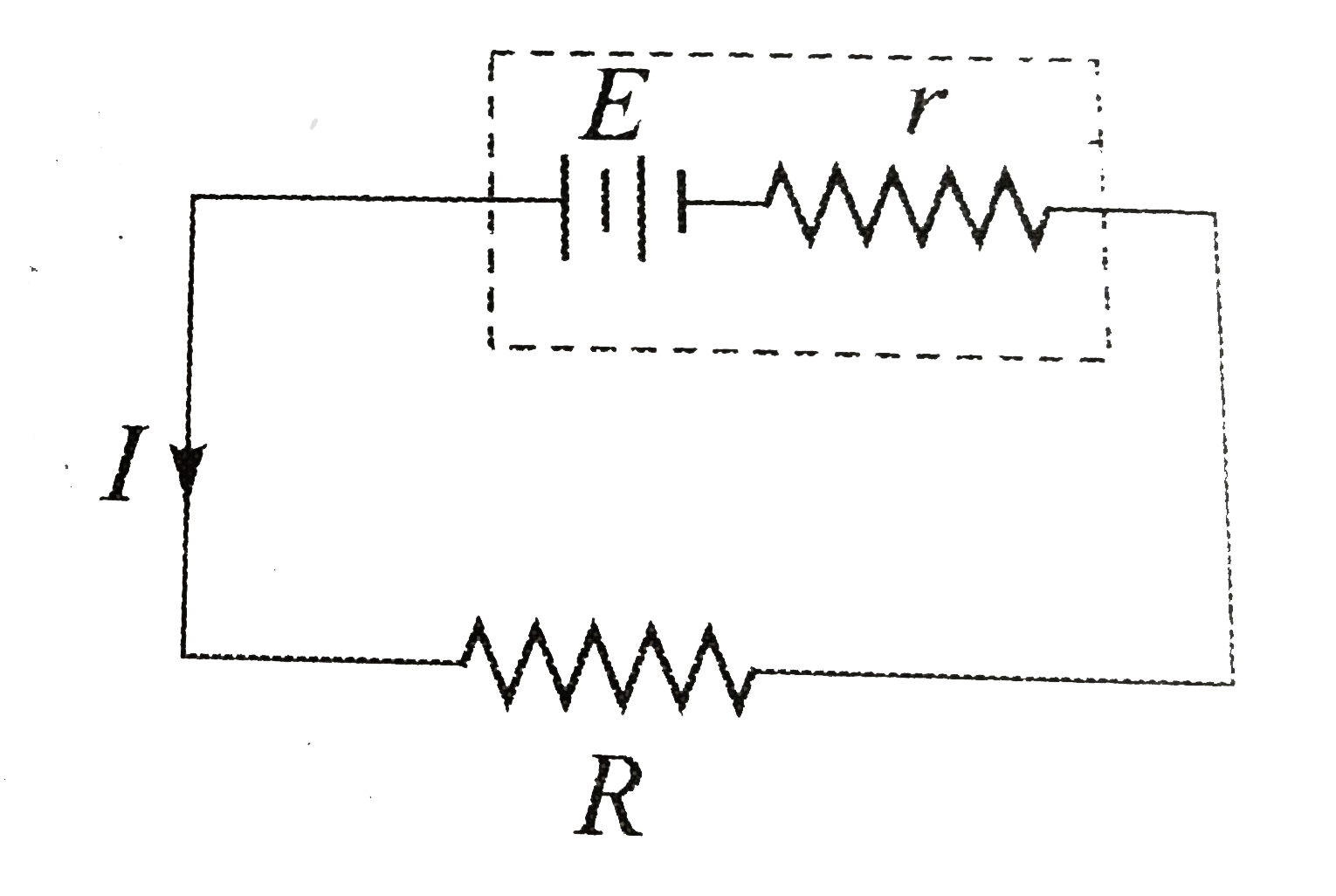Electric fuse is a protective device used in series with an electric circuit or an electric appliance to save it from damage due to overheating porduced by strong current in the circuit or application. Fuse wire is generally made from an alloy of lead and tin, which has hifh resistance and low melting point. It is connected in series in an electric installation. If a circuit gets accidentally short-circuited, a large current flows, then fuse wire melts away, which causes a break in the circuit. The power through fuse (F') is equal to heat energy lost per unit area per unit time (h) (neglecting heat loses from ends of the wire).
P=I2R=h×2πrl[R=ρlπr2]
where r and l are the length and radius of fuse wire, respectively.
A Battery is described by its emf (E) and internal resistance (r). Efficiency of battery (η) is defined as the ratio of the output to the input power.
η=OutputpowerInputpower×100%
![Electric fuse is a protective device used in series with an electric circuit or an electric appliance to save it from damage due to overheating porduced by strong current in the circuit or application. Fuse wire is generally made from an alloy of lead and tin, which has hifh resistance and low melting point. It is connected in series in an electric installation. If a circuit gets accidentally short-circuited, a large current flows, then fuse wire melts away, which causes a break in the circuit. The power through fuse (F') is equal to heat energy lost per unit area per unit time (h) (neglecting heat loses from ends of the wire). P = I^2R = h xx 2pirl [R = (rhol)/(pir^2)] where r and l are the length and radius of fuse wire, respectively. A Battery is described by its emf (E) and internal resistance (r). Efficiency of battery (eta) is defined as the ratio of the output to the input power. eta = (Output power)/(Input power) xx 100% But I= E//(R+r), input power = EI. Output power = EI - I^2r, then. eta = ((EI - I^2r)/(EI)) xx 10 (1-(Ir)/E) xx 100 =1 - (E/(R+r)) (r/E) xx 100 = (R/(R+r)) xx 100 We know that output power of a source is maximum when the external resistance is equal to internal resistance, i.e., R = r . The maximum power rating of a 20.0 Omega fuse wire is 2.0 kW. This fuse wire can be connected safely to a DC source (negligible internal resistance) of](https://d10lpgp6xz60nq.cloudfront.net/physics_images/BMS_V03_CA2_E01_169_Q01.png)
But I=E/(R+r), input power = EI.
Output power =EI−I2r, then.
η=(EI−I2rEI)×10(1−IrE)×100
=1−(ER+r)(rE)×100=(RR+r)×100
We know that output power of a source is maximum when the external resistance is equal to internal resistance, i.e., R = r .
The maximum power rating of a 20.0Ω fuse wire is 2.0kW. This fuse wire can be connected safely to a DC source (negligible internal resistance) of
300 V
190V
250 V
220 V
The correct Answer is:B
b. I∝r3/2
I1I2=(4r)3/2r3/2=81
P=v2Ror2×103=V220
or V=200V
η=RR+r×100, where R = r, efficiency will be maximum.
Topper's Solved these Questions
- MISCELLANEOUS VOLUME 3BOOK - CENGAGE PHYSICSCHAPTER - MISCELLANEOUS VOLUME 3EXERCISE - Interger Answer type
20 Videos
- MISCELLANEOUS VOLUME 3BOOK - CENGAGE PHYSICSCHAPTER - MISCELLANEOUS VOLUME 3EXERCISE - Fill in the blanks
10 Videos
- MISCELLANEOUS VOLUME 3BOOK - CENGAGE PHYSICSCHAPTER - MISCELLANEOUS VOLUME 3EXERCISE - Assertion and Reason Type
8 Videos
- MECHANICAL PROPERTIES OF SOLIDSBOOK - CENGAGE PHYSICSCHAPTER - MECHANICAL PROPERTIES OF SOLIDSEXERCISE - Question Bank
4 Videos
- MISCELLANEOUS VOLUME 5BOOK - CENGAGE PHYSICSCHAPTER - MISCELLANEOUS VOLUME 5EXERCISE - Integer
12 Videos
Similar Questions
Electric fuse is a protective device used in series with an electric circuit or an electric appliance to save it from damage due to overheating porduced by strong current in the circuit or application. Fuse wire is generally made from an alloy of lead and tin, which has hifh resistance and low melting point. It is connected in series in an electric installation. If a circuit gets accidentally short-circuited, a large current flows, then fuse wire melts away, which causes a break in the circuit. The power through fuse (F') is equal to heat energy lost per unit area per unit time (h) (neglecting heat loses from ends of the wire).
P=I2R=h×2πrl[R=ρlπr2]
where r and l are the length and radius of fuse wire, respectively.
A Battery is described by its emf (E) and internal resistance (r). Efficiency of battery (η) is defined as the ratio of the output to the input power.
η=OutputpowerInputpower×100%

But I=E/(R+r), input power = EI.
Output power =EI−I2r, then.
η=(EI−I2rEI)×10(1−IrE)×100
=1−(ER+r)(rE)×100=(RR+r)×100
We know that output power of a source is maximum when the external resistance is equal to internal resistance, i.e., R = r .
Efficiency of a battery (nonideal) when delivering the maximum power is
View SolutionElectric fuse is a protective device used in series with an electric circuit or an electric appliance to save it from damage due to overheating porduced by strong current in the circuit or application. Fuse wire is generally made from an alloy of lead and tin, which has hifh resistance and low melting point. It is connected in series in an electric installation. If a circuit gets accidentally short-circuited, a large current flows, then fuse wire melts away, which causes a break in the circuit. The power through fuse (F') is equal to heat energy lost per unit area per unit time (h) (neglecting heat loses from ends of the wire).
P=I2R=h×2πrl[R=ρlπr2]
where r and l are the length and radius of fuse wire, respectively.
A Battery is described by its emf (E) and internal resistance (r). Efficiency of battery (η) is defined as the ratio of the output to the input power.
η=OutputpowerInputpower×100%

But I=E/(R+r), input power = EI.
Output power =EI−I2r, then.
η=(EI−I2rEI)×100=(1−IrE)×100
=[1−(ER+r)(rE)]×100=(RR+r)×100
We know that output power of a source is maximum when the external resistance is equal to internal resistance, i.e., R = r .
Two fuse wires of same potential , material have length ratio 1:2 and ratio of radius 4:1. Then respective ratio of their current rating will be
View Solution
Knowledge Check
Electric fuse is a protective device used in series with an electric circuit or an electric appliance to save it from damage due to overheating porduced by strong current in the circuit or application. Fuse wire is generally made from an alloy of lead and tin, which has hifh resistance and low melting point. It is connected in series in an electric installation. If a circuit gets accidentally short-circuited, a large current flows, then fuse wire melts away, which causes a break in the circuit. The power through fuse (F') is equal to heat energy lost per unit area per unit time (h) (neglecting heat loses from ends of the wire).
P=I2R=h×2πrl[R=ρlπr2]
where r and l are the length and radius of fuse wire, respectively.
A Battery is described by its emf (E) and internal resistance (r). Efficiency of battery (η) is defined as the ratio of the output to the input power.
η=OutputpowerInputpower×100%

But I=E/(R+r), input power = EI.
Output power =EI−I2r, then.
η=(EI−I2rEI)×10(1−IrE)×100
=1−(ER+r)(rE)×100=(RR+r)×100
We know that output power of a source is maximum when the external resistance is equal to internal resistance, i.e., R = r .
Efficiency of a battery (nonideal) when delivering the maximum power isA100%B50%C90%D40%Electric fuse is a protective device used in series with an electric circuit or an electric appliance to save it from damage due to overheating porduced by strong current in the circuit or application. Fuse wire is generally made from an alloy of lead and tin, which has hifh resistance and low melting point. It is connected in series in an electric installation. If a circuit gets accidentally short-circuited, a large current flows, then fuse wire melts away, which causes a break in the circuit. The power through fuse (F') is equal to heat energy lost per unit area per unit time (h) (neglecting heat loses from ends of the wire).
P=I2R=h×2πrl[R=ρlπr2]
where r and l are the length and radius of fuse wire, respectively.
A Battery is described by its emf (E) and internal resistance (r). Efficiency of battery (η) is defined as the ratio of the output to the input power.
η=OutputpowerInputpower×100%

But I=E/(R+r), input power = EI.
Output power =EI−I2r, then.
η=(EI−I2rEI)×10(1−IrE)×100
=1−(ER+r)(rE)×100=(RR+r)×100
We know that output power of a source is maximum when the external resistance is equal to internal resistance, i.e., R = r .
Two fuse wires of same potential material have length ratio 1:2 and ratio 4:1. Then respective ratio of their current rating will beA8:1B2:1C1:8D4:1A fuse is used in an electric circuit to
Abreak the circuit when excessive current flows through the circuitBbreak the circuit when power gets ofCindicate it the current is flowing uninterruptedDicomplete the circuit for flow of current
Fuse is connected in an electric circuit.
View SolutionDefine electric fuse. How is it acted as a safety device in an electric circuit ?
View SolutionA fuse is used in a electric circuit to
View SolutionDevice used to control the current in an electric circuit is
View SolutionDevice used to regulate the current in an electric circuit is
View Solution
